|
|
|
Sort Order |
|
|
|
Items / Page
|
|
|
|
|
|
|
| Srl | Item |
| 1 |
ID:
096036


|
|
|
|
|
| Publication |
2010.
|
| Summary/Abstract |
Energy security has received remarkably little conceptual attention, despite an abundant literature in which various meanings of the term proliferate, together with a copious proxy terminology. This article attempts to clear this conceptual underbrush and to address the question, in what sense is energy a security issue? Drawing on academic and policy-related sources, the article demonstrates that three distinct logics of energy security are currently in circulation: a logic of war, a logic of subsistence and a 'total' security logic. These distinct logics carry different meanings of energy and security, embed political hierarchies, and have distinct vocabularies, policy vehicles and normative consequences. Yet, affixing energy to security affects not only energy policy but also the manner in which we understand security itself. At least potentially, the ubiquity of energy as a 'prime mover' makes security ubiquitous, thus blurring the boundaries that have made it a domain of specialist knowledge and practice. By making security politically unexceptional and 'total', energy can thus strip security of its precise meaning, rendering it banal and vacuous. Taking a contextual perspective that emphasizes conceptual variation and the participation of lay actors in producing the meaning of security, the article rejects the banalization of security, and discusses the normative and political problems inherent in any totalizing view of the kind latent in energy security.
|
|
|
|
|
|
|
|
|
|
|
|
|
|
|
|
| 2 |
ID:
099885
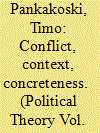

|
|
|
|
|
| Publication |
2010.
|
| Summary/Abstract |
In Reinhart Koselleck's history of concepts, the general orientation that concepts are to be understood in their proper contexts is intertwined with the assumption that they are manifestations of particular political conflicts. The essay shows that the dense compound of context and conflict in Koselleck's thought springs from Carl Schmitt's political theory and also forms an important point of continuity between Koselleck's early work and his later methodological writings. The formalized assumption of conflict, somewhat problematically, binds Koselleckian conceptual history to a particular conception of politics, one that sees politics ultimately as struggle and conflict. Once the historical-theoretical contingency of this conception is recognized, it becomes both possible and necessary to reassess the role of conflict in the methodology of conceptual history.
|
|
|
|
|
|
|
|
|
|
|
|
|
|
|
|
| 3 |
ID:
165924
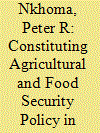

|
|
|
|
|
| Summary/Abstract |
Political economy analyses of agricultural and food security policies in Malawi have emphasized the role played by domestic politics and, more specifically, the centralization of power in the executive. This paper builds on this perspective by exploring the view that such policies are in fact negotiated outcomes of interactions at the state–donor interface. Using interview data gathered from expert key informants and a review of publicly available data, the paper explores how certain policy drivers have interacted to shape agricultural and food security policies in Malawi. The results reveal that policy processes in the recent past have been driven and mediated by fiscal considerations, sociopolitical pressures, and pragmatism, which accounts for the unique and complex peculiarities of the Malawi context.
|
|
|
|
|
|
|
|
|
|
|
|
|
|
|
|
| 4 |
ID:
179013


|
|
|
|
|
| Summary/Abstract |
This paper is about self-identification by a sample of young people with various migrant backgrounds in Sweden. In a survey we asked them how they present themselves to others in different contexts (in their schools and neighbourhoods or when they are out of Sweden). Our findings suggest that young people’s identification is not fixed. The paths to these various forms of identification are shaped by a variety of individual (class background, parents’ country of origin) and social factors (friendship networks and school composition). The results indicate that those who identified themselves as Swedish or hyphenated tended to be quite similar as regards their other characteristics, while those who presented themselves with the parents’ birth country or religious affiliation have very little in common.
|
|
|
|
|
|
|
|
|
|
|
|
|
|
|
|
| 5 |
ID:
133784
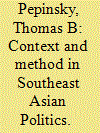

|
|
|
|
|
| Publication |
2014.
|
| Summary/Abstract |
This essay introduces and evaluates a central debate about context sensitivity in Southeast Asian political studies. Within this diverse field, there is no agreement about what context means, or how to be sensitive to it. I develop the idea of unit context (traditionally, the area studies concern) and population context (traditionally, the comparative politics concern) as parallel organizing principles in Southeast Asian political studies. The unit context/population context distinction does not track the now-familiar debates of qualitative versus quantitative analysis, nor debates about positivist epistemology and its interpretivist alternatives, nor even political science versus area studies. Context is not method, nor epistemology, nor discipline. Rather, the core distinction between unit-focused and population-focused research lies in assumptions about the possibility of comparison, or what methodologists call unit homogeneity. While I conclude on an optimistic note that a diverse Southeast Asian political studies (embracing many disciplines and many methodologies) is possible, the fact remains that unit context and population context are fundamentally incommensurate as frameworks for approaching Southeast Asian politics, and that population context is the superior approach.
|
|
|
|
|
|
|
|
|
|
|
|
|
|
|
|
| 6 |
ID:
126528


|
|
|
|
|
| Publication |
2013.
|
| Summary/Abstract |
This paper offers a holistic study on the complex relationships between crude oil, corn and ethanol during a turbulent period between 2006 and end of 2011. Through a holistic mapping of the current market situation and a contextual analytical design we show that there exists a strong relationship between crude oil and corn markets on one side, and crude oil and ethanol on the other. However, the price relationship between corn and ethanol was revealed to be less straightforward, and is driven by the US government fuel policy. Furthermore the study indicates that corn markets have became more prone to volatility due to ethanol production, especially when the demand for corn is high and/or the crude oil prices are high enough to create a competitive market for ethanol.
|
|
|
|
|
|
|
|
|
|
|
|
|
|
|
|
| 7 |
ID:
157107
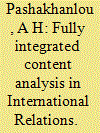

|
|
|
|
|
| Summary/Abstract |
Content analysis has once again come to the forefront of discussions regarding methods in International Relations (IR). The first wave of content analysis in IR lasted from the 1940s to the 1960s and was marked by a commitment to quantitative and manual analyses. The second wave of content analysis appeared at the start of the third millennium and continues to pervade the discipline. As with the first wave, it proceeds in a predominantly quantitative manner but emphasizes computer-assisted analysis rather than manual analysis. Critics and advocates of the method alike have, highlighted numerous shortcomings with these approaches. In order to address these limitations, the present investigation argues for a fully integrated content analysis that has the potential to ameliorate the identified weaknesses that have hitherto plagued the method. It accomplishes this task by combining all facets of the method: quantitative, qualitative, manual, and computer-assisted content analyses within a single research project.
|
|
|
|
|
|
|
|
|
|
|
|
|
|
|
|
| 8 |
ID:
167454
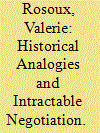

|
|
|
|
|
| Summary/Abstract |
This article questions the role of historical analogies in reaching – or not – effective and durable agreements. It compares two emblematic cases, the Israeli-Palestinian case and the Franco-Algerian case, and focuses on the tension that exists between the weight of the past and the need to move forward. The purpose of the article is not to reduce the hardest cases to their historical dimension. It is rather to show that the ways in which the memories of past events are interpreted, misinterpreted, or even manipulated create the context that shapes peace processes. The analysis is structured on the three main functions attributed to historical analogies: representing the unfamiliar, assigning social roles, and framing action. The examination of these functions helps us to better understand how negotiators and mediators can try to live with the memories rather than without them or against them.
|
|
|
|
|
|
|
|
|
|
|
|
|
|
|
|
| 9 |
ID:
096940
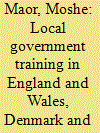

|
|
|
|
|
| Publication |
2010.
|
| Summary/Abstract |
This article highlights an interesting and often unduly neglected aspect of comparative public policy and administration: local government training. The argument advanced is that local government training based on the centrally focused model may tend to be: (i) skill-oriented and competence-framed; (ii) comprehensive; and (iii) quality-controlled in a relatively rigorous manner. By contrast, local government training based on the locally focused model may tend to be: (i) skill-oriented and competence-framed alongside a focus on 'people' and organizational issues, conventional policy issues and broad local government issues; (ii) non-comprehensive, and (iii) weakly controlled for quality. The integrative model, which is the most innovative form of the three models presented here, may tend to manifest a varied mix of the aforementioned features. Based on an institutional analysis combined with interviews with senior training officials at national and local levels, this argument is illustrated in England and Wales, Denmark and Israel in the hope that it could be a starting point for developing hypotheses and propositions.
|
|
|
|
|
|
|
|
|
|
|
|
|
|
|
|
| 10 |
ID:
098447
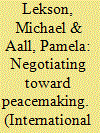

|
|
|
|
|
| Publication |
2010.
|
| Summary/Abstract |
This article outlines the approach of the United States Institute of Peace (USIP) to training in negotiation and associated skills. USIP has provided such training for over a decade to a wide array of international practitioners, both those who are in some way directly engaged in, or at least affected by, a conflict, and international third parties from outside the conflict zone. USIP concentrates in its negotiation training on building an understanding of the negotiating environment as well as on building specific negotiation strategies. In addition to skill-building, the training programs focus on developing an understanding of the nature and dynamics of conflict and of the overlapping and interlocking nature of actors, issues, and interests in a conflict situation. The article points out five elements of content that must be included to ensure a successful program, providing illustrative examples from actual workshops. These elements include helping participants to establish effective relationships with negotiating counterparts; presenting basic concepts; acquiring and improving skills; practicing through simulations; and working together on how best to apply these skills to the real world conflicts with which they are dealing. The two case studies describe training programs for Serbian and Albanian leaders in Kosovo, and for Iraqi civil servants.
|
|
|
|
|
|
|
|
|
|
|
|
|
|
|
|
| 11 |
ID:
167450
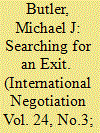

|
|
|
|
|
| Summary/Abstract |
By virtue of their defining criteria, international crises would seem unlikely candidates for conflict management and resolution. However, negotiations among crisis protagonists are not uncommon. Such behavior may reflect a desire to ‘exit’ the crisis dynamic. This article takes up the question of when and in what circumstances actors engaged in crisis situations turn to negotiation. Through an empirical analysis of over 1000 cases of foreign policy crises occurring between 1918 and 2015, this research examines a set of potential contextual, processual and structural correlates of crisis negotiation. The results of this analysis indicate that negotiation is less likely to occur in complex, high stakes, and especially violent crises, suggesting that negotiation is an unlikely and perhaps ill-suited response to more intense and severe crises.
|
|
|
|
|
|
|
|
|
|
|
|
|
|
|
|
| 12 |
ID:
133788


|
|
|
|
|
| Publication |
2014.
|
| Summary/Abstract |
At the contested analytic core of this special issue of Pacific Affairs lie two different ways of linking enlargement to assessment. Southeast Asian studies, as a spatially limited instance of Area Studies (AS), are focused wholly or mainly on one part of the world and on phenomena occurring in it or directly relevant to it. In contrast, no toponym constrains the scope of Comparative Area Studies (CAS). The editors of this issue recommend the expansion of AS into CAS. Does a convincing case for such enlargement from AS to CAS require only a nominal or taxonomic expansion-subsuming more space in which comparisons can be made-without necessarily privileging one method over another? Or does the case for CAS presuppose a negative assessment of AS as less hospitable to systematiccomparison, and thus methodologically inferior to CAS? The discussion that follows is not epistemologically agnostic. Nor is it promiscuous as to methods. But it emphasizes the need for methodological pluralism and the virtues of openness and ecumenism thereby implied. A segue from AS to CAS will multiply the opportunities for comparison along with the scale and complexity of the items, changes, and interactions that could be compared. It may be tempting to simplify all these empirics by filtering them through the lens and format of a systematically reductive technique. It would however be ironic if that understandable temptation were to reproduce in method the narrowness of scope that warranted CAS in the first place. If and as scholars expand their analytic horizons in the hope of making more sense of a globalizing world, the notion of unwanted or uncontrolled comparison may seem less demonic-a "spectral" invitation to chaos-than creative-an intellectually refreshing way of thinking outside of any box whose efficacy depends disproportionally on closure.
|
|
|
|
|
|
|
|
|
|
|
|
|
|
|
|
| 13 |
ID:
158721


|
|
|
|
|
| Summary/Abstract |
IR scholars have always invoked history as a valuable resource for understanding the present. However, the question of how should we go about investigating and interpreting the past is rarely asked, let alone answered. While most IR approaches are anchored to the attempt to situate oneself outside history – reading the past in terms of the present or in terms of a hypothetical future – this article strives to redress the kind of historical perspective adopted, if at all, by IR scholars. It does so by advancing a distinctive historicist approach that emphasises the importance of understanding past practices and discourses in their own historical and intellectual contexts. In order to substantiate this claim, the article goes on to critically engage with recent calls to historicise intervention in IR, arguing that a historicist mode of analysis represents a corrective to presentism as well as an alternative route into present-day debates.
|
|
|
|
|
|
|
|
|
|
|
|
|
|
|
|
| 14 |
ID:
158495
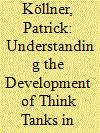

|
|
|
|
|
| Summary/Abstract |
Many new think tanks have emerged in East Asia in recent decades. The region is home to highly diverse and in some cases very vibrant environments for think-tank development. While there are some commonalities among think tanks in East Asia in terms of the models used at the time of their establishment, there is no uniform pattern of think-tank development in the region that can be traced back to the operations of developmental states. This Special Issue explores the driving forces of and the challenges to think-thank development in three specific East Asian settings: Mainland China, Taiwan, and Japan. In particular, the experience with think-tank development in Mainland China raises the necessity of reconsidering prevailing conceptions that think tanks can only prosper in democracies and when they are independent of the government.
Two broad conclusions emerge from this Special Issue. First, the contributions emphasize that context matters for think-tank development and, more specifically, that national think-tank sectors are greatly influenced by the particular political context in which they exist. Second, the contributions show not only that the specific political context factors that impact the trajectories and traits of East Asian think-tank sectors vary between countries, but also that they operate at different interactive levels: (a) at the level of the inter- and transnational context within which think-tank sectors develop; (b) at the level of domestic governmental systems and their openness to external policy advice and other think-tank services; and (c) at the level of individual political leaders interested in engaging with think tanks.
|
|
|
|
|
|
|
|
|
|
|
|
|
|
|
|
|
|
|
|
|